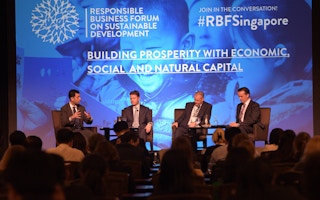Ecosystems provide businesses with trillions of dollars of services a year, but a failure to put a monetary value on this has resulted in unsustainable exploitation that undermines the long term survival of business and society, said a panel of experts.
To continue reading, subscribe to Eco‑Business.
There's something for everyone. We offer a range of subscription plans.
- Access our stories and receive our Insights Weekly newsletter with the free EB Member plan.
- Unlock unlimited access to our content and archive with EB Circle.
- Publish your content with EB Premium.
Speaking at the Responsible Business Forum on Sustainable Development in Singapore, representatives from the environment and accountancy sectors told 450 delegates that understanding the value of natural capital - ecosystems which provide valuable goods and services - was necessary for companies to understand the risks associated with depleting it and the opportunities to be gained by conserving it.
Kaveh Zahedi, regional director and representative for Asia and the Pacific, United Nations Environment Programme (UNEP), cited rapidly depleting fish stocks and biodiversity losses as examples of natural capital losses that would directly undermine the future of fishery and pharmaceutical sectors.
The air purification and carbon sequestration carried out by rainforests, pollination of flowers by bees, and water filtration carried out by soils are other examples of processes that are valuable to society, but are not widely accounted for.
The destruction of natural capital runs up global losses of about US$7.3 trillion every year, said Zahedi, quoting a 2013 study by global ecological accounting initiative The Economics of Ecosystems and Biodiversity (TEEB). In comparison, the total household wealth lost during the 2007 - 2009 financial crisis was US$19.2 trillion.
Richard Mattison, chief executive of Trucost, a UK-based firm which quantifies the value of natural capital to companies, added that the destruction of natural capital was akin to the degradation of a valuable financial asset, and “should be a serious concern for investors”.
He noted that financial markets for agricultural commodities are thrice as volatile today as they were in 2011, and said that major fluctuations are usually triggered by natural disasters such as floods and droughts.
“There is a cost to developing the business economy in an unsustainable way, and we have to understand this,” said Mattison.
He added that while individuals with an interest in sustainability might be convinced of the need to value natural capital, “the real key is to ensure that financial directors, ministers, and other influential figures are interested in driving this approach”.
“
There is a cost to developing the business economy in an unsustainable way, and we have to understand this.
Richard Mattison, chief executive officer, Trucost
To this end, a coalition of environmental groups, accounting firms, and international organisations have embarked on an initiative to develop a Natural Capital Protocol (NCP), a framework that will enable companies to measure and value the natural capital that is used or affected by their business operations.
Launched last October and coordinated by the Natural Capital Coalition, the NCP aims to serve as a guide for the internal decision-making process within organisations, especially those whose supply chains and business operations depend heavily on natural capital.
It will provide information that will help companies manage risks, develop new products, improve value chains, and explore new revenue streams.
The protocol, whose development is being led by the World Business Council on Sustainable Development, will include one set of guidelines applicable to senior executives from all sectors, and two sector-specific guides for the food and beverage, and apparel sectors.
Pieter van der Gaag, interim executive director of the Natural Capital Coalition, shared that the team behind the project was currently working with companies to shape and test the protocol’s methodology, and that it would be ready by March 2016.
While the protocol would outline how the results of a company’s efforts to value its natural capital could be presented, it would not be a reporting standard, stressed van der Gaag. He added that other reporting standards such as the Global Reporting Initiative or the International Integrated Reporting Council could choose to incorporate the protocol into their standards.
To ensure that the financial services sector does its part to balance the protection of natural capital with profit-driven investment, delegates called for investors and stock exchanges to mandate sustainability reporting among companies. They also suggested measures such as socially responsible investing and purchasing green bonds as sustainable business strategies.
Sharing on how Singapore’s financial sector could help safeguard natural capital, Toby Heaps, chief executive of Canadian investment advisory and research firm Corporate Knights, said that the Singapore Exchange (SGX), who in October announced that it would be making sustainability reporting mandatory for all listed companies, could include specific requirements such as carbon emissions to be disclosed for all companies.
He added that as the city-state’s financial regulator, the Monetary Authority of Singapore also has the opportunity of being the first in the world to require listed equity funds to disclose the carbon footprints of their holdings.
This would be an especially powerful way to drive the global economy towards better protection of natural capital, said Heaps.
“Such guidelines would bring together the most powerful entities in the economy and the most important global issue, climate change,” he noted.





















